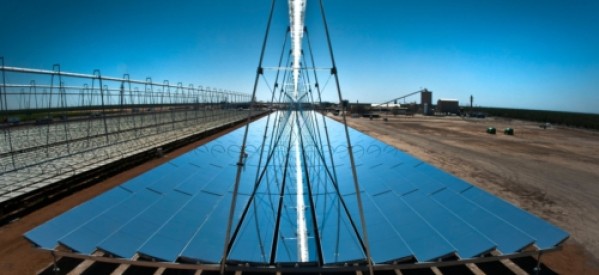Fraunhofer ISE and India in MoU for Solar R&D

Secretary Ratan P. Watal in the Ministry of New and Renewable Energy (MNRE), Government of India and Prof. Eicke Weber, Institute Director of the Fraunhofer Institute for Solar Energy Systems ISE, Freiburg signed a MoU a short time ago in Berlin in the presence of Sujata Singh, the Indian Ambassador to Germany.
“For a long time now, Fraunhofer ISE and India have been involved in joint projects and the exchange of researchers,” says Eicke Weber. “I am pleased that, with the signing of the MoU, an official basis has now been established for intensifying the cooperation. In India, scientific acclaim, great scientific expertise and large areas of land are coincident. These three aspects set the ideal conditions for solar applications.”
On the Indian side, the Solar Energy Center SEC in Delhi, which belongs to the MNRE, will coordinate the work with Fraunhofer ISE. Examples of planned pilot projects are photovoltaic test centers, the development of test regulations for concentrating collectors, solar thermal desalination demonstration systems and hydrogen technology for stationary and mobile applications.
Many projects between Fraunhofer ISE and India already have been planned in detail or are in the development phase. Thus, concentrator photovoltaics shall produce renewable hydrogen, which, upon demand, is converted into electricity using a polymer electrolyte membrane (PEM) fuel cell. This type of fuel cell is also of interest for the field of electric mobility. In practical applications, the most important feature is a long lifetime under the given climate conditions.
Therefore, test facilities for PEM fuel cells shall be built at the Solar Energy Center in India. Fraunhofer ISE holds experience in this field and has developed an outdoor test facility for material investigations, life-cycle tests and the analysis of climate factors on fuel cells. On this test stand, 30 test cells can be simultaneously analyzed under real conditions; for example, with respect to the effects of air pollution. The test stand can be set up at any given location and operates autonomously with integrated controls and safety monitoring.
In a project sponsored by the German Ministry for Education and Research (BMBF), a linear Fresnel collector was constructed that generates process heat up to 200 degrees Celsius. In contrast to the well-known parabolic trough concentrators, this Fresnel technology uses rows of flat mirrors mounted on holders near to the ground. Each row is tilted at an angle to achieve the optical effect of a parabolic concentrator.
The reflected sunlight is concentrated on an absorber tube located above the mirrors. For this type of collector, the manufacture, tracking and maintenance are simpler than those for concentrator systems using curved mirrors. Using the long standing expertise of the researchers at Fraunhofer ISE as a basis, a prototype customized for production in India was developed. Now measurements of the prototype are to be carried in a demonstration power plant.
For nearly two years, the scientists in Germany have assisted their Indian colleagues by carrying out simulations and evaluations in the IndiaOne project. In this project, a 1 MW electric solar thermal power plant is set up, based on the Scheffler reflector technology. The system provides both heat and electricity for the Brahma Kumaris Talheti complex in Rajastan.






